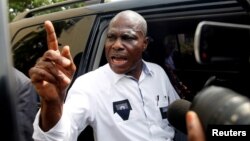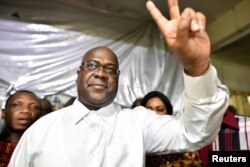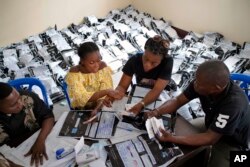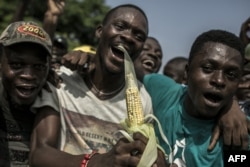Congo’s election crisis deepened early Sunday when the Constitutional Court confirmed the win of Felix Tshisekedi, rejecting claims of fraud, and runner-up Martin Fayulu promptly declared himself the country’s “only legitimate president.”
Fayulu’s supporters have alleged an extraordinary backroom deal by outgoing President Joseph Kabila to rig the vote in favor of the opposition after the ruling party’s candidate did so poorly that a Plan B was needed. Neither side has acknowledged the accusations.
The court, however, said Fayulu offered no proof to back his assertions that he had won easily based on leaked data attributed to the electoral commission.
Fayulu urged Congolese to take to the streets to peacefully protest what he called “constitutional coup d’etat,” accusing the court of validating false results. “It’s no secret ... that you have elected me president,” he said.
Neither Congolese nor the international community should recognize Tshisekedi, nor obey him, Fayulu added.
Tshisekedi: Congo won
Tshisekedi said early Sunday that the Constitutional Court’s decision confirming him as the winner of the presidential election was a victory for the entire country.
“It is Congo that won,” said Tshisekedi, speaking to his supporters after the court decision. “It is not the victory of one camp against another. I am engaged in a campaign to reconcile all Congolese. ... The Congo that we are going to form will not be a Congo of division, hatred or tribalism. It will be a reconciled Congo, a strong Congo that will be focused on development, peace and security.”
The largely untested Tshisekedi, son of the late, charismatic opposition leader Etienne, is to be inaugurated Tuesday. His supporters who had gathered outside the court cheered.
African Union doubts
“It’s a shame that Mr. Fayulu wants to stay isolated,” Tshisekedi’s spokesman, Vidiye Tshimanga, told The Associated Press. He said the two men once had been part of an opposition coalition demanding that Kabila step down.
The new president will need everyone for the reconstruction of the country, Tshimanga said, as the Congolese people have “suffered a lot in recent years.”
The court’s declaration came shortly after the African Union in an unprecedented move asked Congo to delay announcing the final election results, citing “serious doubts” about the vote. It planned to send a high-level delegation Monday to find a way out of the crisis, fearing unrest spilling across borders of the vast Central African nation.
Congo’s government replied it was up to the courts.
The court turned away Fayulu’s request for a recount in the Dec. 30 vote.
Government spokesman Lambert Mende quickly acknowledged the court’s decision, congratulating Tshisekedi as Congo’s fifth president.
Mineral rich country
The country of 80 million people, rich in the minerals key to smartphones, is moving close to achieving its first peaceful, democratic transfer of power since independence in 1960.
But observers have warned that the court’s upholding of the official results could lead to further unrest. At least 34 people have been killed since provisional results were released Jan. 10, the United Nations has said.
The court could have ordered a recount or ordered a new election.
It called unfounded a challenge filed by another candidate, Theodore Ngoy, that objected to the electoral commission’s last-minute decision to bar about 1 million voters from the election over a deadly Ebola virus outbreak.
The court said Tshisekedi won with more than 7 million votes, or 38 percent, and Fayulu received 34 percent. However, leaked data published by some media outlets, attributed to the electoral commission and representing 86 percent of the votes, show that Fayulu won 59 percent while Tshisekedi received 19 percent.
Threat to Kabila, allies
Fayulu, a lawmaker and businessman who is outspoken about cleaning up Congo’s sprawling corruption, is widely seen as posing more of a threat to Kabila, his allies and the vast wealth they have amassed.
All of the election results, not just the presidential ones, had been widely questioned after Kabila’s ruling coalition won a majority in legislative and provincial votes while its presidential candidate finished a distant third.
Congo’s election was meant to take place in late 2016, and many Congolese worried that Kabila, in power since 2001, was seeking a way to stay in office. Barred from serving three consecutive terms, Kabila already has hinted he might run again in 2023.
After Tshisekedi was announced as the surprise winner in provisional results Jan. 10, some Congolese weary of turmoil appeared to decide that replacing Kabila with an opposition figure was enough, despite questions about the vote.
Reflecting the yearning for stability, 33 Congolese non-governmental groups and civil society movements Thursday called on people to comply with whatever the court rules to “preserve the peace.”
With that perhaps in mind, Tshisekedi’s party sharply rejected the AU’s attempted intervention.
The continental body’s stance is “the work of some mining lobbies seeking to destabilize the Democratic Republic of Congo in order to perpetuate the looting of this country,” the party’s secretary-general, Jean-Marc Kabund, said in a statement.
Ahead of the court’s ruling, hundreds of Tshisekedi’s supporters were in the streets of the capital, Kinshasa, waving tree branches and banners reading “Congo for the Congolese.”









